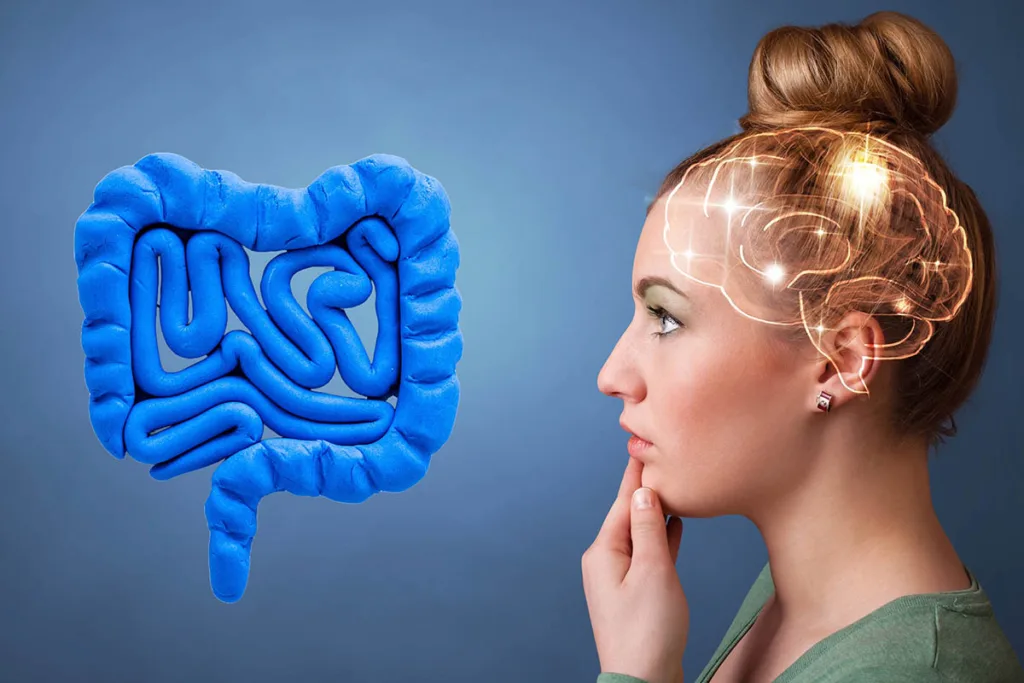The gut-brain connection
The brain and the gut talk to each other constantly. In simple terms, our gut tells the brain what and how it’s doing, and our brain tells the gut when we are safe to digest food and when there is danger and digestion must be slowed down. This is a necessary survival mechanism, but if the brain constantly tells the gut to not digest, gut symptoms can happen, worsen and become prolonged. Experts are beginning to recognize the gut-brain connection as a major cause of IBS, hence the new classification for IBS: a disorder of gut-brain interaction.
Our nervous systems form the connection between the brain and the gut. Our gut communicates to the brain about the health of the gut, digestive processes, and what is inside the gut (metabolites, microbes, inflammatory molecules etc.) (20). The brain, on the other hand, communicates to the gut about stress and rest, and many other things. The autonomic nervous system, enteric nervous system, vagus nerve, HPA-axis, gut hormones, immune system and gut microbiota all play a role in carrying information back and forth (19,20).

Changes to this communication circuit have been connected to many disorders, not only IBS, such as obesity, neurological illnesses, swallowing difficulty and even pain and fatigue. (19)
What happens, is that the enteric nervous system (our gut’s own nervous system) is largely responsible for orchestrating digestive processes, like maintaining normal gut motility, secretions and blood flow, but the autonomic nervous system can disrupt this in a threatening situation (e.g. stress). Studies have also shown that there is a higher incidence of IBS among people with post-traumatic stress disorder and early childhood adversities (27,33), which means that long term stress has the ability to maintain gut symptoms and trigger them more easily.
The microbiota also has a large effect for example through the neurotransmitters and the short chain fatty acids they produce, which is why the gut-brain axis is often called the gut-brain-microbiota axis. This circuit not only is connected to gut symptoms, but it can also influence our mood, and more serious psychiatric issues, as the brain has interactions that allow for signals from the gut to mix with complex emotional and social processes. The gut microbiota also takes part in estrogen metabolism, which can explain increased IBS symptoms after menopause. (19)
But where does the problem begin – in the brain or in the gut? Research says that it could be either or. It seems that our brain is probably where problems begin more often, being triggered by stress and the stress response, but a change in the gut environment, such as after a gut infection, could be what triggers IBS from the “bottom up”. (33-35)
Something important to know also, is that studies are showing that brain structures and function can be different in people with IBS as compared to healthy people. The brain is responsible for processing and interpreting information from the body, and the changes in the brain are such that can make us more sensitive to stress, pain/gut symptoms and emotions. The areas of the brain that receive sensory information have abnormal structural changes that can lead to increased information flow from the gut, which means that more stimuli can wrongly be interpreted as danger. The changes in the brains of people with IBS are also connected to biased threat estimation and expectation on outcomes, hyperarousal and symptom focused attention. This means that people with IBS may catastrophize their symptoms more easily, notice and respond to actual and expected gut sensations more easily, and their mood and emotions may be more volatile. This all can lead to the feedback loop in which IBS symptoms become triggered and maintained. (33)
What can be done about this? After all, we are talking about actual brain structure changes! Well, all of the relaxation and stress release techniques available in “Tools” for example are helpful, as are also mindset work which is discussed in “IBS-cycle” and in “Positive affirmations and mindset” -tool. Also consider cognitive behavioral therapy. (33)
In short, the gut-brain(-microbiota) axis is affecting many gut functions and if there are shifts in this communication, this can mean problems in all areas of digestion mentioned in this lesson. Stress and anxiety can disrupt the communication between the gut and the brain, and gut issues, in turn, can drive psychological symptoms. Balancing the gut-brain axis is vital, which can be achieved through relaxation and stress release methods. See also the chapter “IBS cycle” for more details. Building resilience to stress leads to calming of the IBS cycle, as resilience is connected to the optimal functioning of the autonomic nervous system and the stress response.